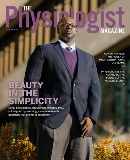Postdoc Appreciation
How can the postdoctoral system be improved?

Each issue, we ask a trainee member to pose their career questions to an established investigator and mentor. Here, Kibrom M. Alula, PhD, an APS 2021–2022 Postdoctoral Fellow at the University of Colorado, Anschutz Medical Campus, asks Luis “Gabby” Navar, PhD, FAPS, professor and chair at Tulane University School of Medicine, about the postdoc system.
Q: Postdocs are often considered underpaid and overworked for the amount of time they invest in research work. How can the
postdoc system be improved?
A: Through the many years that I had postdoctoral fellows, I always emphasized that the stipends should not be considered salaries, although I know that this is starting to be considered
as a salary. The stipend is meant to partially defray expenses while the fellow has an extended period of advanced scholarly research and training that will provide the foundation for future work and perhaps the fellow’s entire career. That
is why the ideal situation is for the fellow to join a laboratory and have a mentor who works in the area that is of greatest interest to the fellow and will launch the fellow’s career. Obviously, the research performed will support the mentor’s
research program, but it will also provide an opportunity for the fellow to attain recognition as an emerging investigator in the particular research area. It is not an ideal situation if the fellow is simply performing assigned laboratory work for
the principal investigator without being allowed to contribute intellectually. Under these conditions, salary becomes the benchmark, and success is measured by the salary and not the investigational advances. Call me an idealist, but I have lived
and worked by these concepts, and when my fellows left me they felt ownership of a specific area of research achieved during the period of postdoctoral activity.
“If you feel that you have a job, you probably are working to live, but if you feel you have a vocation, then you live to work. I believe that most great scientists lived to work.”
Q: Any tips on how to work to live, not live to work?
A: I am not a good person to answer this question because I look back at my life and I can say that I probably lived to work and felt that this was essential
if I was to achieve success and recognition. However, I have had many good times and enjoyed my non-working days. My work also gave me the opportunity to travel to many parts of the world, and I always enjoyed these adventures very much. Yet, I was
still working. I guess that if you feel that you have a job, you probably are working to live, but if you feel you have a vocation, then you live to work. I believe that most great scientists lived to work. Here I am, 80 years old and still working
because I enjoy my work and enjoy mentoring students and fellows.
Q: There has been a lot of talk recently about journals and the scientific community
disregarding negative data. Do you feel negative data has value? How can we report on and use negative data to improve research?
A: We have to remember that we are supposed to be unbiased experimentalists with a hypothesis
to be tested. The experimental approach should not be contrived to yield a positive answer and should give an equal chance to go either way. Nevertheless, a negative result also means something because it leads to alternative possibilities. If viewed
within this framework, negative data are publishable and yield significant insights, but one has to be creative. Some of my best projects resulted from negative data that led to the study of alternative hypotheses.
Got a career question you'd like to submit? Email it to tphysmag@physiology.org. We may use it in an upcoming Mentoring Q&A.
This article was originally published in the March 2022 issue of The Physiologist Magazine.
The Physiologist Magazine
Read the Latest Issue
Don’t miss out on the latest topics in science and research.
View the Issue Archive
Catch up on all the issues of The Physiologist Magazine.
Contact Us
For questions, comments or to share your story ideas, email us or call 301.634.7314.


